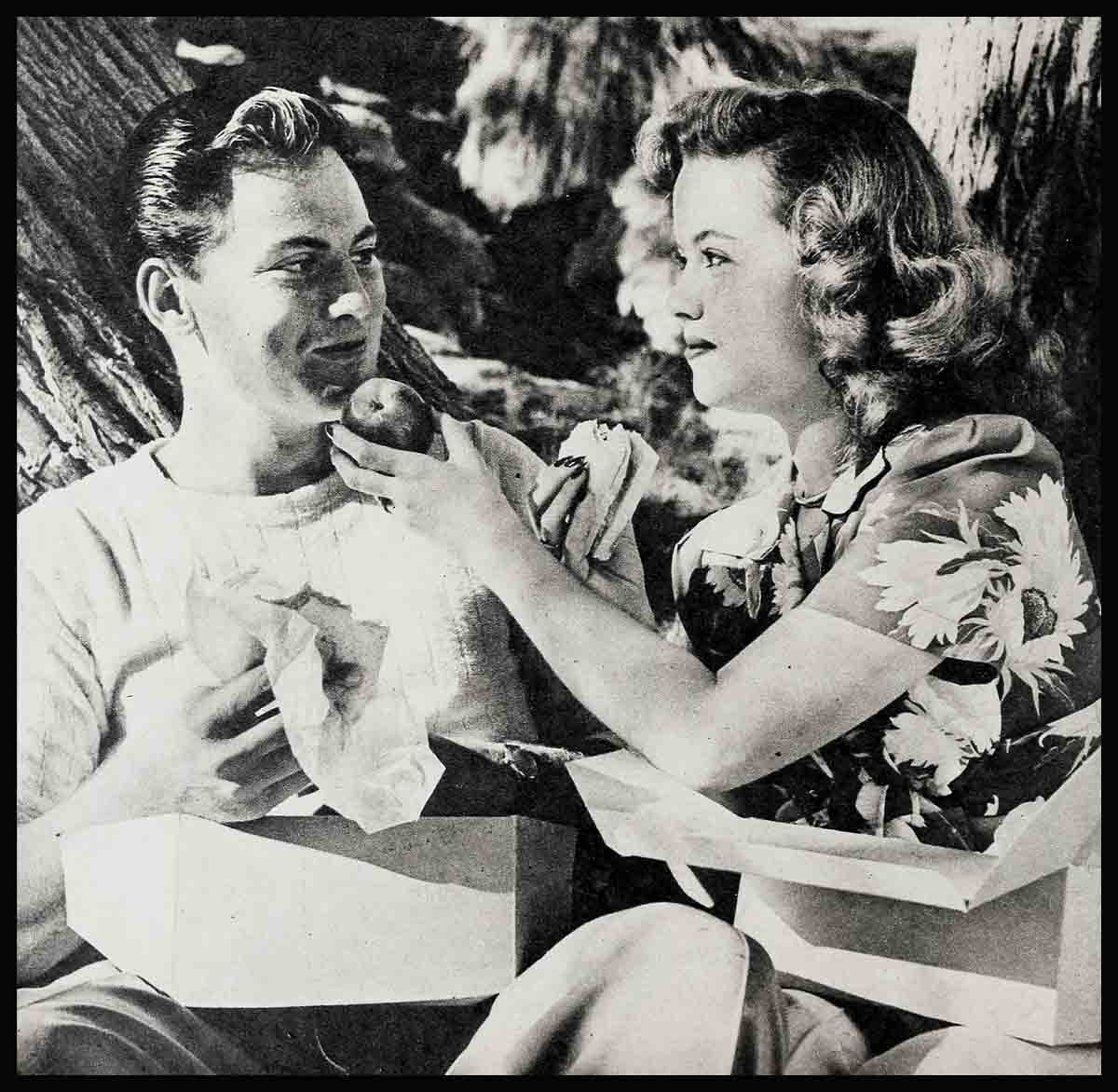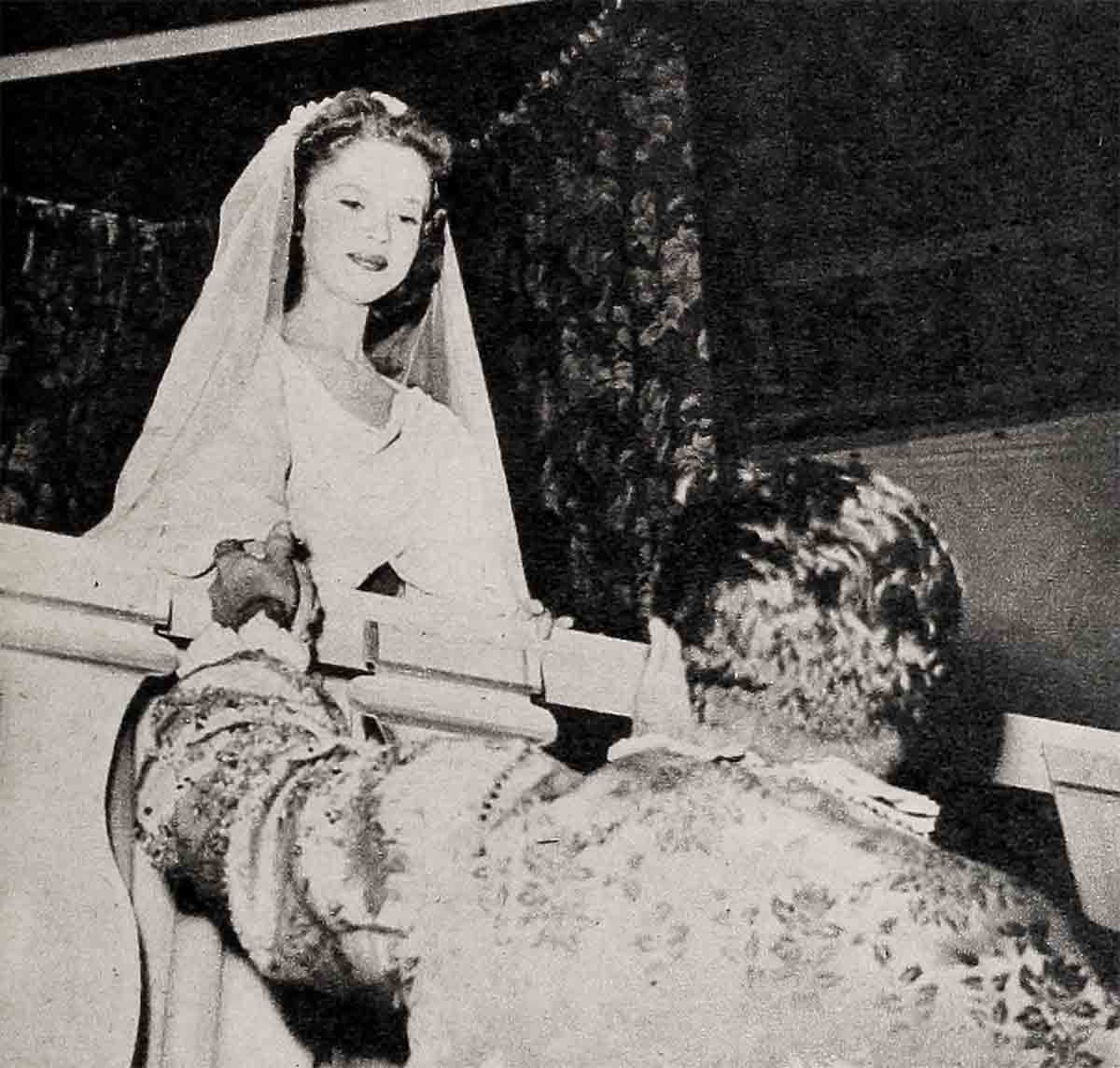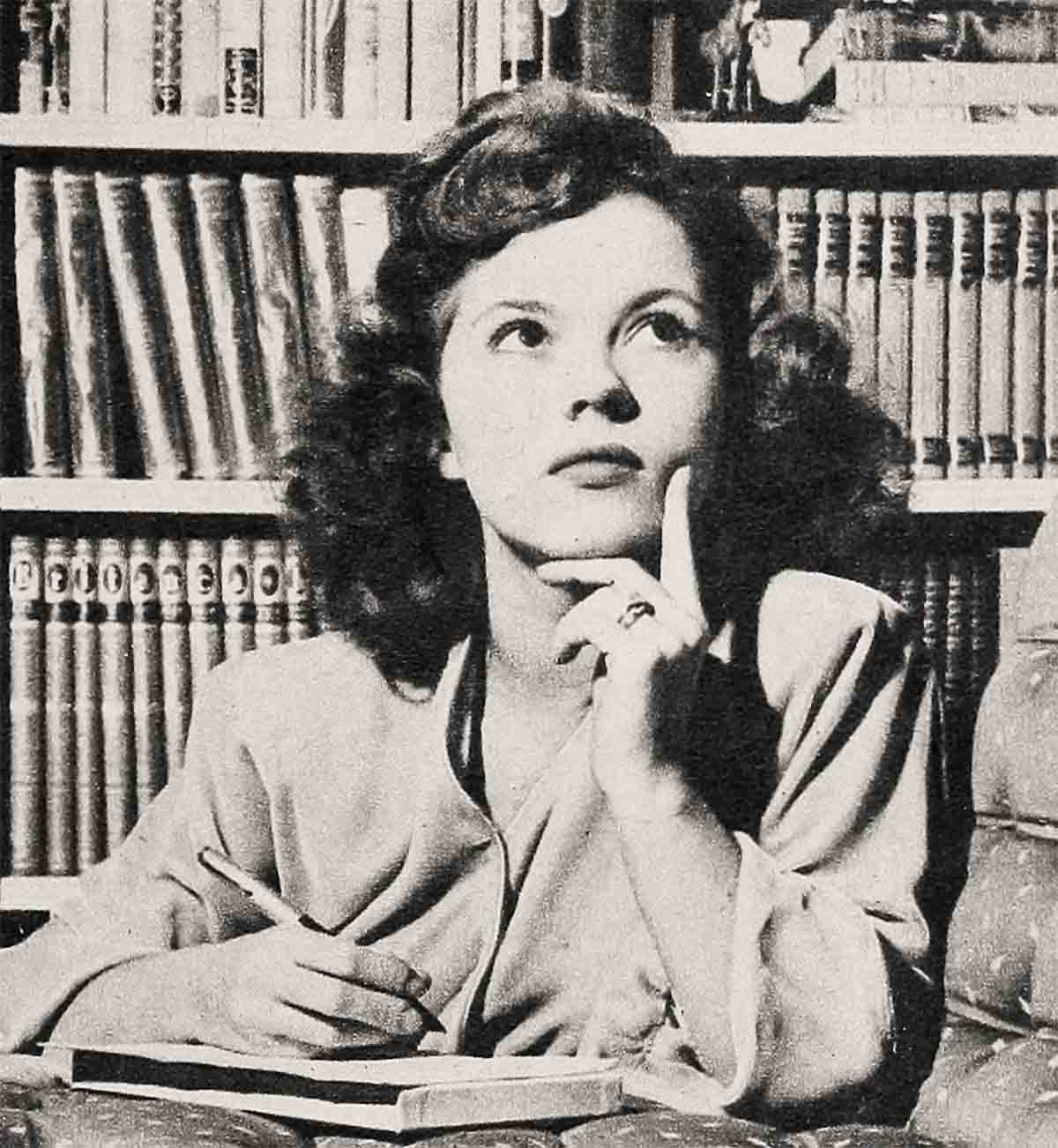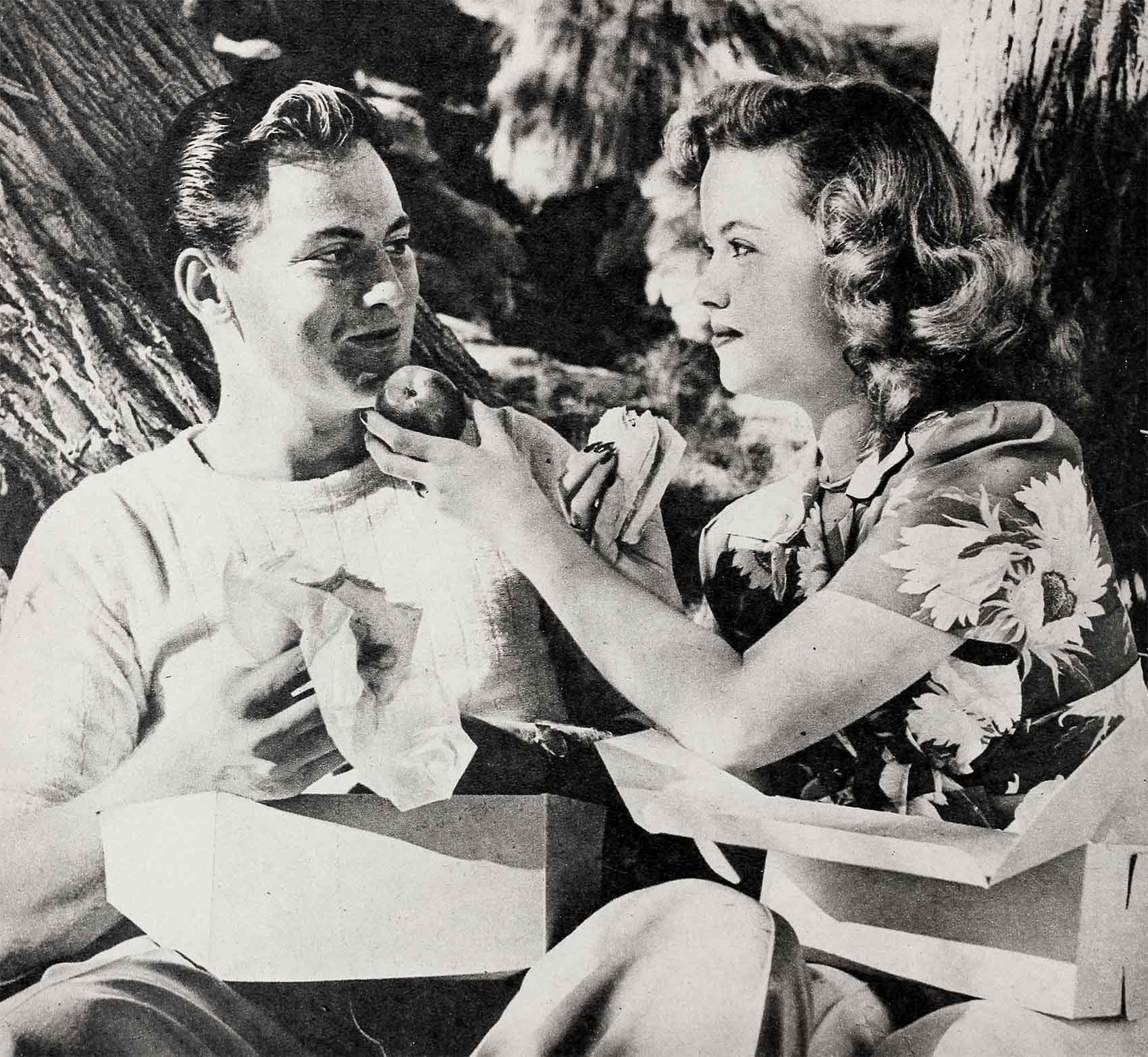
Great Expectations—Shirley Temple & John George Agar Jr.
The morning after it was announced that Shirley Temple Agar was expecting a child, long distance paged Shirley in great excitement. “London, England, calling,” the operator said.
A sheared, British accent came thinly over the wires. It identified itself as representing one of England’s largest newspapers and then asked, “Miss Temple, what is your baby going to do?”
“Going to do?” Shirley repeated.
“Career and such,” the voice went on.
“Oh, I guess my baby will just have the career of a baby,” Shirley said.
“Thank you so much,” said London, England, and hung up.
Before that day ended, Shirley had received a phone call from China, had been interviewed by correspondents from Brazil, Uruguay and Costa Rica, and had been loaded down by an armful of telegrams. Frenzy reigned on the set of her picture, That Hagen Girl.
The next day, letters started coming, along with little baby shoes.
“If this goes on,” Shirley told me, “our baby will be the best-booted baby in forty-eight states.”
She was talking in a low voice, as she opened her front door, and led the way down winding stone steps to the lower floor of the Agar home.
“Jack’s asleep,” she said, once we were downstairs in the room which had always housed her huge doll collection. Not long ago, Shirley redecorated, covering the glass show-cases with floral panels that slide back to reveal shelves of costumed dolls. Shirley’s interior decoration teacher at Westlake always insisted Shirley could have been a top decorator, if she hadn’t liked acting so much.
Now, Shirley closed the last panel and settled down on a carmine love-seat. “I’m so sorry about the hushing and tiptoeing,” she said, “but poor Jack hasn’t been well. They’ve got him full of penicillin and sulfa because of an ear infection. This was the last day of the picture for us both, and he’s worn out.”
Shirley, herself, seemed anything but worn out. There was a new, bright light in her eyes. “I’m being very careful to carry out all the doctor’s orders,” she said. “last spring, our own family doctor died, but he had told me when I got married whom he wanted me to have when I had a baby. And that man is my doctor now.”

good news . . .
“Jack and I,” Shirley went on, “both work for David O. Selznick, and when we told him our news, he felt it would be best if the studio sent out a simple announcement. So, that’s what was done. That evening, at dinner, the telephone rang. When I answered it, a man’s voice told me he was from an evening paper. ‘Mrs. Agar,’ he said, most apologetically, ‘I really don’t know where to begin. But a man who says he’s from Selznick’s just told me you were going to have a baby.’ He sounded as if he were all braced for me to deny it. ‘Well, I am,’ I said. There was a long silence. Then he said, weakly, ‘Oh, thank you!’ and the line went dead.”
Shirley leaned back and laughed. “Our baby’s going to be born in January, a slightly belated Christmas present, you might say. And what better present could we get?”
The most constant question asked of the Agars is whether they want a boy or a girl. “We don’t care,” Shirley says, “as long as it’s healthy. If it’s a boy, he’ll have his father’s name—John George Agar. And the wonderful part about that name is that it includes my father’s name—George—and both my brothers’—John and George.
“We haven’t picked out a name for a girl. It won’t be Shirley, because we want a one-syllable name to go with Agar.
“What makes it special fun for me is that my brother Jack’s wife, Miriam—we call her Mims—is expecting her second child just about two weeks before me. They’ve got a little boy already, four years old, so Mims is a great help to me. We spend hours together, comparing notes, and right now, Mother’s crocheting afghans for us. My afghan will be pink, because I’m having almost everything pink for the baby. I think blue sometimes makes babies look wan.
“Then, too, blue is the predominating color in the nursery, so pink will contrast well with it.”
When Shirley rearranged the house, before getting married, a guest room was built on, close to the Agar’s own bedroom. “We called it a guest room,” Shirley grins, “but I had my own ideas—hopes, perhaps, is a better word. So I put in blue and white striped wallpaper, and had rosebuds on the ceiling. There’s a blue rug and ruffly white curtains, and it will be the pretties kind of a background for a crib.”
Shirley has started some knitting for the baby, but, because of the picture work in which she has been involved these past few months, it has not progressed far.
“Only now I’m going to have a lot of time on my hands,” she said. “And the knitting will get done. I’m not going to try any sewing. But, with Mother, and Jack’s mother helping, I won’t need to worry about the baby being well covered.
“I hope it will arrive before Jack’s birthday, the 31st of January. He’ll be twenty-seven then, and I’d like it to be born while he’s twenty-six. Of course, there’s a chance I might make it a double birthday, and have it right on the 31st. But if I don’t, there are plenty of other family birthdays I might hit in January—my sister-in-law, Joyce, was born in January, and so was my brother George.
“I’m going back to acting, afterward,” Shirley hastens to say. “My ambition is to be a character woman when I’m fifty.

“However, without work to keep me busy these next months, I’m making plans to fill my time. I know myself well enough to know I have to be occupied; I don’t want to get self-centered and miserable.”
She plans to return to the cooking school she attended just after she was married, too. The past few months, the Agars have had a cook—a necessity when Shirley is working—and Shirley doesn’t intend to replace her in the kitchen. What she wants is to take some advanced courses in the sort of exotic dishes that one can prepare before guests. Crepe-suzettes, shish-kebab; dishes that are fun to make.
“Golf is forbidden, naturally,’ Shirley said. “I suppose I could go on with the piano, but I never liked practicing.”
Everyone wants to know if Shirley is going to let the baby play with the dolls she, Shirley, has received from all over the world since she first became a star.
“I think,” she says, “that babies like to have one favorite doll. Then it can be a friend. If they have a lot of dolls, none of them is important. Besides, most of these dolls are too perfect—collector’s items. They’re not the sort you take to bed with you, cry over when you’re unhappy, or that help you when you make mud-pies.”
Probably, as much has been written about Shirley as about any living personality. She doesn’t seek publicity, but she appreciates what it means to an actor. “Provided, you don’t let it throw you. That was one of the hardest lessons for Jack.
“At first, he used to get so mad.” She looked impish as she recalled the earlier days. “Especially when lies were printed. He’d want to go out and get them retracted.”
Next to her approaching motherhood, Shirley is most enthralled by Jack’s acting career. They had just that day completed making War Party, his first picture, in which they play opposite each other.
“Jack has a wonderful part in it,” she said, proudly. “He’s lucky because it is not the sort of part which carries the whole weight of the picture. He plays a young second-lieutenant, just out of West Point and I play the daughter of an older West Pointer, a colonel (Henry Fonda).
“John Ford directed, and it has his stamp on it—a great deal of action, and little talk.

young man on a horse . . .
“In War Party, Jack had to ride a great deal. He hadn’t been on horseback for seven years but it came back to him easily. He loved every minute of the shooting. He’s got one of those interested minds. He wants to know how everything works. Before we were through, he knew all about the cameraman’s work, the dimmer machine, the mike, makeup—everything. By the end of the first day, it seemed he knew every member of the crew by name!”
Shirley has always been impressed by her husband’s memory for names. She, herself, suffers from forgetfulness along this line, and she’s come to depend on his help.
“Besides,” she explained, “it’s really easier for him. He meets them fresh, and the impression lasts. With me, people keep coming up and saying, ‘Remember me?’ and ten to one I haven’t seen them since I was six years old.”
The word around the studio where War Party was made is encouraging about Jack’s career. Merian Cooper, the producer, has told everyone that Jack Agar shows every sign of becoming a star.
And Shirley’s mother, reporting one such conversation with Cooper, added, “Jack’s sincere and so direct as a person, and he comes across on the screen the same way.”
War Party is Shirley’s first costume picture since she made Bluebird, and she enjoyed getting back into costumes again.
“But,” and once more that ready smile was back, “those long, dragging skirts do get so filthy. I only hope the new fashions stop long before they touch the ankles!”
Any current report on the Agars should include word on the newest addition to the family group, Shirley’s parakeet. It is named “April” because it was Jack’s birthday present to her this year. The parakeet, it appears, is a violent individualist, and has resolutely refused to learn any of the words that Shirley tried to teach it.
“He mutters to himself,” Shirley said, “and it sounds almost intelligible. But he certainly has blighted the life of the canary. Whenever the poor canary opens his mouth to sing, April steps in with a song of his own, a parody of the canary’s voice. And lately it’s got really bad. The canary is so discouraged, he doesn’t even try to sing any more. He just sits and sulks, and sends black, non-canary looks at April. But April’s not down-hearted—he’s chipper.”
April is not alone in being chipper. Everyone around the Agar home is feeling gay and, as Shirley notes, “Since our announcement, the whole family, in-laws and all, have never looked better!”
THE END
—BY DEE LOWRANCE
It is a quote. MODERN SCREEN MAGAZINE DECEMBER 1947




